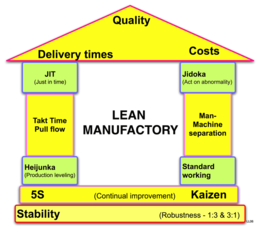 If you’ve been in the manufacturing industry for any significant length of time, you may have come across the term “lean manufacturing.” Many companies are now utilizing lean manufacturing practices to improve their output and generate higher profits. But what exactly is lean manufacturing? If you’re still scratching your head trying to grasp the concept of this term, keep reading for a practical breakdown of its definition.
If you’ve been in the manufacturing industry for any significant length of time, you may have come across the term “lean manufacturing.” Many companies are now utilizing lean manufacturing practices to improve their output and generate higher profits. But what exactly is lean manufacturing? If you’re still scratching your head trying to grasp the concept of this term, keep reading for a practical breakdown of its definition.
Lean manufacturing (also known as lean production or just lean) is a process through which manufacturing companies seek to eliminate waste. Toyota Production Systems (TPS) pioneered the philosophy back in the 1990s, promoting it throughout their manufacturing facilities in an effort to reduce unnecessary waste and improve customer value. Due to the widespread success of Toyota, many other manufacturers began looking into its practices, revealing lean manufacturing as a tool it used to generate success.
Whether you work in the automotive industry or any other manufacturing-related sector, lean manufacturing can certainly prove beneficial. Conventional wisdom should lead you to believe that less waste translates into higher profits, which of course if true. By reducing the amount of waste that your company produces, you’ll reap the benefits of higher profits. Furthermore, lead manufacturing offers public relations benefits as well, promoting a positive image for your company.
Lean manufacturing may also reduce the risk of work-related injury and incidents. When manufacturing companies turn a blind eye to waste, it creates a dangerous environment that often leads to injury. This problem is easily avoided, however, by taking steps to reduce waste and promote greater efficiency in the workplace. Of course, these are just a few of the many benefits provided by lean manufacturing. If you’re looking to implement lean manufacturing into your company’s daily routine, check out the tips listed below.
Lean Manufacturing Tips
- Perform an evaluation of your company’s daily operations, identify sources of waste.
- Train workers on how to work effectively and efficiently.
- Invest in machines and heavy equipment to automate tasks that are currently being performed manually by human workers.
- Consider switching to sustainable manufacturing practices.
- Encourage teamwork among employees, with workers lending assistance when needed.
- Research and mirror the lean manufacturing practices performed by other companies.
- Lean manufacturing practices should be adopted throughout all departments, not just a single department.
